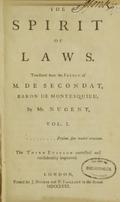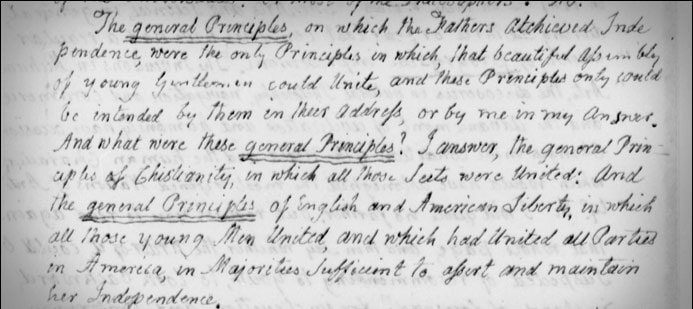|
Conservatism is the philosophy that the wisdom of the past is still just as applicable today as it was then. Conservatism is an ancient wisdom in itself, for every age has its conservatives and liberals, and it is always the conservatives who succeed and pass their wisdom down to the next age where some new brand of liberals will rise up to challenge that wisdom once again.
0 Comments
Nearly 3,500 years ago, the nation of Israel faced a pandemic so deadly that it killed 23,000 men in a single day. That was 4% of the total population of Israel. All of those who contracted this disease did so by committing a capital crime, and the initial defeat of the disease was accomplished by sentencing all of the survivors to death. But that's not the end of the story.
One of the most fascinating things about the Old Testament is the fact that God established a republican government in ancient Israel. Most people today think that Israel had a standard monarchical form of government, but that was not the case. Israel (and Judah) never had a true monarchy. Throughout their history, they were always a republican nation characterized by popular elections of their rulers. (For more on this topic see my free eBook The Bible and the Constitution.)
When God established Israel’s government, He also taught the Jews how to choose the right kind of leaders. Those instructions can be found in Exodus 18:21, Deuteronomy 1:13, and Deuteronomy 17:15-20. The qualifications listed in these and other passages are not difficult. There were thousands of men in Israel who met them. God intentionally set the standard low so that the various offices could be filled. He gave the Jews a list of the barest minimum standards that would allow their government to function with good men in positions of leadership. I wasn't planning to write this. When I heard about Trump's brave new guidance for prayer in schools, I tried to just ignore it and get on with my life. I figured that I had gotten enough of my friends mad at me for the time being and that I should just let this particular opportunity slide on by. However, I saw so many of my friends posting about how wonderful Trump was for issuing these new guidelines that I finally decided to actually read the guidelines for myself and see what all the fuss was about.
Dear Bro. Charles, By now, you have almost certainly heard about the contention between Pastor Dan and the deacons of First Baptist Church. In fact, it would be nigh impossible for you to have missed it. Unfortunately, there is a lot of misinformation being spread by both sides of the conflict, and I wanted to write you to ensure that you received an accurate account of the proceedings up to this time. Of course, I won’t be able to go into a lot of detail, but I hope that this overview will help you to sort out truth from fiction among all the conflicting reports that you have read. I recently had the opportunity to listen to a debate between Mark Hall and Steven Green on the topic of the Christian foundation of America. Hall has written a book defending the idea that America had a Christian foundation, and Green has written a book in defense of the opposite view. I obviously agree with Hall, but I thought that he could have done a better job of refuting some of Green’s claims (and he probably does so in his book). Since I was taking notes anyway, I thought that I would share a few of my objections to Green’s claims.
One of the major points of contention in the discussion of America’s Christian foundation is found in a reference that John Adams made to the “general principles of Christianity.” Those who support the idea that America was founded on Christian principles often present this statement as evidence in their favor, while those who disagree with them usually respond by pointing to the context of the statement as evidence for their position. Unfortunately, most of those discussing Adams’ statement seem to be operating under the impression that it was made in a vacuum. In this article, I will attempt to provide a full analysis of Adams’ letter and demonstrate that when we consider all of the variables in their proper order, it becomes clear that this letter supports the claim that America was founded on principles that are unique to Christianity.
Ever since the Constitution was first submitted for ratification, the final clause in Article VI has been a matter of strong contention among Americans. That clause, known as the religious test clause, simply states that “no religious Test shall ever be required as a Qualification to any Office or public Trust under the United States.” It is frequently claimed that this clause represents the desire of the founding fathers to keep religion out of the government and to establish a secular nation. But is that really how this phrase was intended to be used?
Recently, a friend of mine asked me for my thoughts on Dr. Wayne Grudem's article answering objections to voting for Donald Trump. Dr. Grudem responded to 11 objections and then wrote a lengthy comparison of the proposed policies of Trump and Hillary followed by an appeal for Christians to "seek what is best for the nation." I read Dr. Grudem's article and jotted down the following thoughts in response to his answers:
 One of the most influential books during the American founding era was the book The Spirit of the Laws by the Baron of Montesquieu, and as is the case with most of the ancient philosophers, most Americans have never read Montesquieu's work. This has become especially evident in the current dispute over the President's claim that the religion of Islam played a significant role in the formation of our nation. Many historians have agreed with the President on this point, but if the founders of our nation were even half as influenced by Montesquieu as historians claim that they were, then it would be nearly impossible for them to have accepted Islam as a good foundation on which to build a nation. In The Spirit of the Laws, Montesquieu concluded "that a moderate government is most agreeable to the Christian religion, and a despotic government to the Mahometans," and then he defended that conclusion with this analysis: |
Bill Fortenberry is a Christian philosopher and historian in Birmingham, AL. Bill's work has been cited in several legal journals, and he has appeared as a guest on shows including The Dr. Gina Show, The Michael Hart Show, and Real Science Radio.
Contact Us if you would like to schedule Bill to speak to your church, group, or club. "Give instruction to a wise man, and he will be yet wiser: teach a just man, and he will increase in learning." (Proverbs 9:9)
Search
Topics
All
Archives
June 2024
|











 RSS Feed
RSS Feed